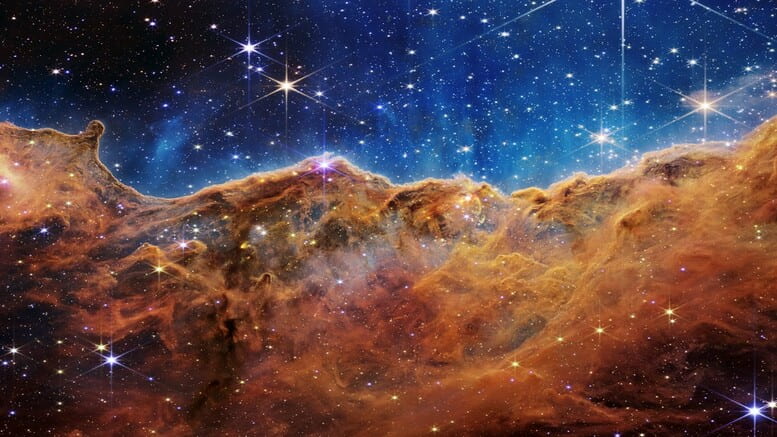Northwestern professors gain early access to NASA’s James Webb Space Telescope
July 24, 2022

As NASA’s new James Webb Space Telescope is officially transitioning into scientific operations, Northwestern University astrophysicists Allison Strom and Farhad Yusef-Zadeh will have early access to the device within the next month. Strom will lead the CECILIA (Chemical Evolution Constrained using Ionized Lines in Interstellar Aurorae) Survey, which studies the chemistry of distant galaxies while Yusef-Zadeh will contribute to a team researching star formation in the Milky Way galaxy.
The CECILIA survey aims to understand the chemical compositions of far away galaxies which can provide insight on how they form and evolve.
Strom joined Northwestern as an assistant professor of physics and astronomy at Weinberg and as a key member of Northwestern’s Center for Interdisciplinary Exploration and Research in Astrophysics (CIERA). In her previous role, she worked as a Carnegie-Princeton Postdoctoral Fellow at Princeton University and has used some of the world’s largest telescopes to observe “adolescent galaxies.” Yusef-Zadeh, professor of physics and astronomy, has spent nearly 40 years researching the center of the Milky Way and has led the charge on major discoveries during that time.
“One of the principal goals of modern astronomy — and one of the main scientific drivers for JWST — is to understand how galaxies formed and evolved in the early universe,” Strom said. “A key piece of evidence is what those galaxies are made of. With CECILIA, we have a chance to directly measure the chemistry of distant galaxies, using an incredibly powerful method that is only possible with JWST. CECILIA will be the cipher, similar to the Rosetta Stone, that enables astronomers to crack the code and accurately interpret the thousands of other spectra of distant galaxies that JWST will observe throughout its lifetime.”
Learn more in Northwestern Now’s article, “Northwestern astrophysicists snag early time on James Webb Space Telescope.”
Space

First Radio Pulses Traced to Dead-Star Binary
March 12, 2025
An international team of astronomers, including a Northwestern University astrophysicist, has traced a series of mysterious radio pulses to an unprecedented home. Starting a decade ago, astronomers have detected a pulse of radio emission every…

Flickers and Flares: Milky Way’s Central Black Hole Constantly Bubbles With Light
February 18, 2025
The supermassive black hole at the center of the Milky Way appears to be having a party — and it is weird, wild and wonderful. Using NASA’s James Webb Space Telescope (JWST), a Northwestern University-led…

Black Holes’ Spins Align in a Valentine’s Embrace
February 14, 2025
Most people have heard of “love at first sight.” But how about “love at first collision?” In a study fit for Valentine’s Day, Northwestern University astrophysicists discovered that binary black holes — when formed in…

Astrophysicist Adam Miller Receives Cottrell Scholar Award
February 13, 2025
Northwestern University astrophysicist Adam Miller has received a 2025 Cottrell Scholar Award from the Research Corporation for Science Advancement (RCSA), the United States’ first foundation wholly dedicated to science. Miller is among a diverse group of 16…



